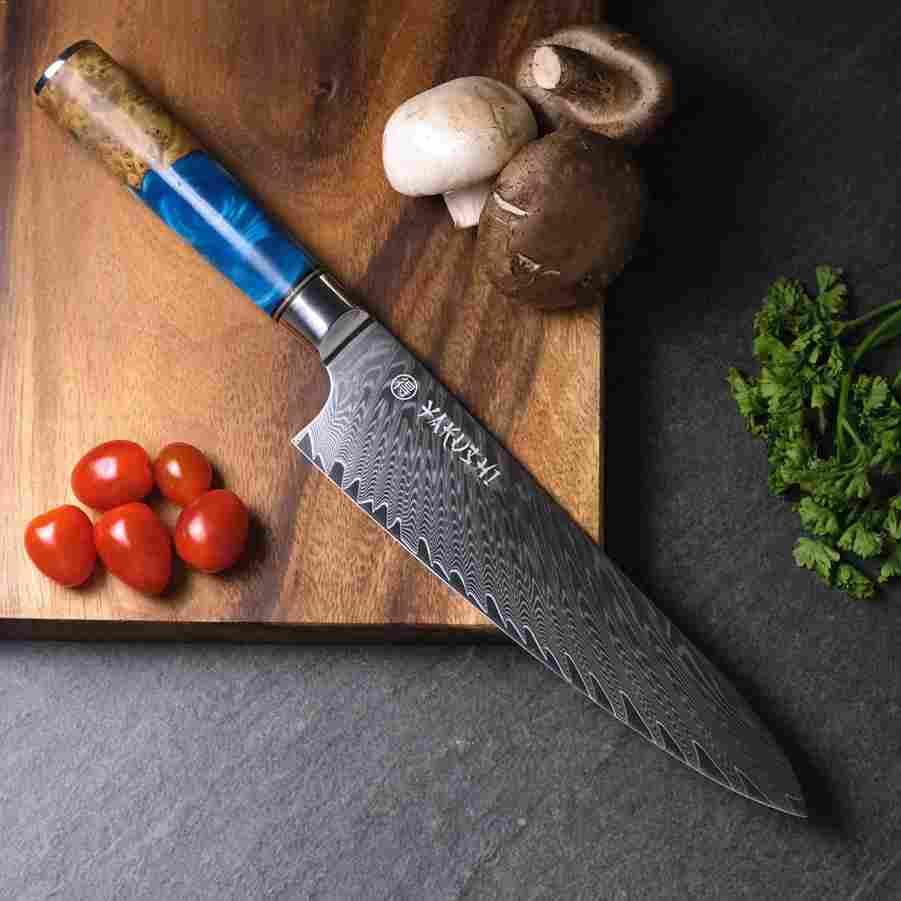Knives are indispensable in every professional kitchen. They are the core tools chefs use daily to prepare ingredients with precision and speed. A well-chosen knife helps chefs work efficiently, ensuring consistency and high-quality results in every dish. Whether chopping, slicing, or mincing, knives are essential for any task. The variety of knife store available, such as chef’s knives, paring knives, and serrated knives, cater to different purposes, making them versatile tools in the kitchen. Without the right knives, the work of a professional chef would be much harder, leading to inefficiencies and potentially compromised food quality.
Precision in Food Preparation
One of the key reasons knives are essential for chefs is their ability to offer precision. Precision is crucial when preparing food, especially in fine dining, where the presentation and texture of each dish are of utmost importance. The sharp and well-maintained damascus knives allow chefs to make clean, accurate cuts, ensuring ingredients are sliced uniformly. This not only helps in maintaining the aesthetic appeal of the dish but also ensures even cooking. For example, uniform slices of vegetables or meat cook at the same rate, improving both taste and texture.
Efficiency in the Kitchen
Knives are designed to maximize efficiency, which is essential for any professional chef. When knives are sharp and well-balanced, they cut through ingredients quickly and smoothly. This minimizes the time spent on preparation, allowing chefs to focus on other aspects of cooking. In a busy kitchen, speed is crucial. A blunt knife can slow down work, increasing the risk of accidents and reducing the overall efficiency of the team. Therefore, knives are indispensable for keeping the kitchen running smoothly, ensuring that tasks are completed in a timely manner.
Variety of Knives for Different Tasks
A professional kitchen requires a variety of knives, each designed for specific tasks. For example, a chef’s knife is versatile and can be used for chopping, slicing, and mincing. A paring knife, on the other hand, is perfect for delicate tasks like peeling and trimming small fruits and vegetables. Serrated knives are ideal for cutting through bread and tomatoes without crushing them. The specific design of each knife ensures that chefs can perform a wide range of tasks effectively and accurately. Having a set of specialized knives allows chefs to handle different ingredients and techniques with ease.
Comfort and Control
The design and ergonomics of a knife are just as important as its sharpness. A comfortable grip and proper balance are essential for providing the chef with control and reducing the risk of hand fatigue. Professional chefs often work long hours, and a knife that is too heavy or uncomfortable to hold can lead to strain and discomfort. High-quality knives are carefully designed with the chef’s comfort in mind, providing a secure grip that reduces the likelihood of accidents and improves the overall handling of the tool. Comfort and control make all the difference in fast-paced, high-pressure kitchen environments.
Durability and Longevity
Knives used by professional chefs are built to last. Made from high-quality materials such as stainless steel or carbon steel, these knives are designed to withstand constant use in a high-stress kitchen environment. A durable knife will retain its sharpness for longer periods, reducing the need for frequent sharpening. Regular maintenance and care can ensure that knives stay in excellent condition, extending their lifespan. For professional chefs, investing in high-quality, durable knives is essential to their work. These knives are more than just tools; they are an investment in the quality and efficiency of their kitchen.
Safety and Accuracy
Safety is a top priority in any professional kitchen. A sharp knife is safer than a dull one because it requires less force to cut through ingredients. When a knife is dull, a chef is more likely to apply excessive force, which increases the chance of the knife slipping and causing injury. A sharp knife allows for cleaner cuts and more control, reducing the risk of accidents. Additionally, professional knives are designed with features like ergonomic handles and weighted blades to prevent slipping and provide better accuracy, further ensuring the safety of the chef during meal preparation.
Enhancing Culinary Skills
Using the right knives can significantly enhance a chef’s culinary skills. Mastery of knife techniques is an essential part of a chef’s training. With the right knife, a chef can cut, dice, chop, and julienne with precision, creating dishes that are both visually appealing and tastefully balanced. Knives allow chefs to focus on the finer aspects of cooking, such as texture, consistency, and presentation. The more skilled a chef becomes with their knives, the more they are able to unlock their full culinary potential, bringing their creative vision to life in the kitchen.
Role of Knives in Kitchen Organization
A professional kitchen is all about organization and order. Knives play a significant role in maintaining that organization. By using the right knife for the right task, chefs can keep their workspace neat and free from clutter. For example, using a chef’s knife for chopping large vegetables and a paring knife for small details helps keep the workspace clear and reduces the chances of cross-contamination. Properly storing knives, such as in a knife block or magnetic strip, also contributes to the overall cleanliness and efficiency of the kitchen. A well-organized kitchen is key to ensuring a smooth and productive work environment.
Essential for Success
In conclusion, knives are more than just tools in the kitchen; they are integral to a professional chef’s success. From offering precision and efficiency to enhancing culinary skills and ensuring safety, knives play a crucial role in every dish prepared. A chef’s knife set is as essential to their work as their culinary knowledge and techniques. With the right knives, chefs can work faster, safer, and more accurately, improving both the quality of the food and the overall dining experience. For any professional chef, knives are not just a necessity—they are the foundation of their craft.






